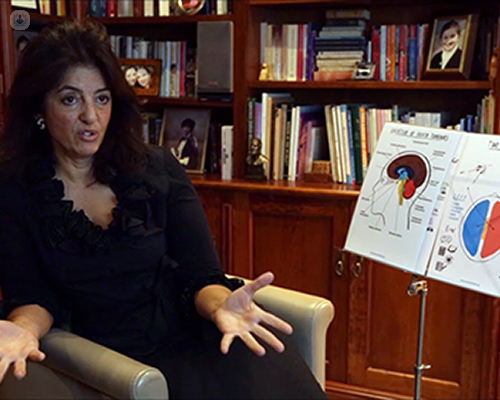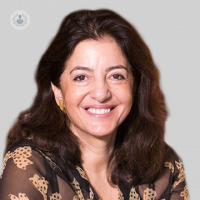Success Charity – life after cure of a childhood brain tumour
Autore:In May 2019, distinguished consultant endocrinologist Dr Helen Spoudeas led the launch of Success Charity – a charity exclusively devoted to improving the quality of life of patients surviving a brain tumour in childhood. We interviewed Dr Spoudeas to find out what support the charity provides and why such support is so desperately needed.

What is Success?
Success is an independent, nationwide, volunteer-run charity enabling brighter futures for survivors of a childhood brain tumour. It is the only charity which focuses solely on life after a brain tumour cure, and the continuing emotional, physical and learning support that children and young people need as they grow up, mature and enter adult life. The charity grew from a pioneering neuroendocrine survivorship service that I ran for 20 years at University College London Hospitals (UCLH) with the help of fundraising through UCLH Charity.
Success was launched at a fundraising dinner at the Houses of Parliament in May 2019 under our patron Dominic Grieve QC, former attorney general. The event was sold out, and we raised £30,000 – a very good result. This is no small thanks to our young ambassador Doron Barsam who spoke at the event about his own experiences of a recurrent brain cancer at the age of 7 years and his subsequent struggles to achieve his current career path. The first Christmas Carol Concert for Success was given in December 2019 by the acclaimed Norfolk Cathedral Choir and its choirmaster, Ashley Grote, father of Emily, at the beautiful medieval Chapel of St Bart’s the Great in the City of London. Our young ambassador Theo Sergiou spoke eloquently of his experiences since diagnosis with metastatic eye cancers at the age of 2 years, and how the charity has supported his potential such that he has met others, gained confidence and achieved his Oxford University place against the odds and despite his blindness. The 400 seats were sold out one month before and next year's concert is already booked for 16th December 2020.
Why is it important to support brain tumour patients after cure?
When you first hear you child has a brain tumour, all you think about is whether there is a cure. Thanks to the millions invested in cancer research, 80% of children now survive. I was the ‘good news’ doctor they saw after they were cured - that is five years from diagnosis - to support their hormone replacement needs, specifically growth and sexual maturation. However, over the last 30 years, as I’ve grown with those survivors in the first and largest UK survivorship service, I've been uniquely placed to see first-hand that while this is a success of sorts, the price of cure is high, and cure alone is not enough. We also have to give back these children’s futures.
Children with brain tumours (whether cancers or low grade) not only endure toxic chemotherapy on a vulnerable, growing body – at doses we adults wouldn’t tolerate – but they have an injury to the brain that we’ve ignored, we don’t recognise or routinely rehabilitate, and we don’t support beyond the end of treatment. Children can go on to experience blindness, deafness, paralysis, stroke, difficulties with memory, learning and behaviour, disfigurement, and bullying, and teachers often don’t understand this because they deem them cured. These children struggle to keep up and as time passes, if they’re not supported, they slip away from their peers and their own potential and have problems.
I’ve come to see that as these children have grown up and become young adults, they feel isolated and lonely, find it difficult to achieve independence, partnerships and employment – we need to support them, not just hormonally but also with the cognitive, emotional and neurological aspects of their condition.
It’s not difficult to fund raise for heroic cancer cures and new cancer treatment centres. By contrast, it’s much harder to raise awareness and NHS funds for the chronic neurorehabilitation aftermath. That’s why we launched the charity and thankfully our beneficiaries’ young voices were quickly heard in Parliament and through our networking annual family conferences for over 150. We now need to support these children beyond cure. Surely that is the point in curing them - to give them back their futures?
How does Success help children who have had brain tumours?
Success is dedicated exclusively to improving the quality of life of any patient treated in the UK for a brain tumour diagnosed before their 19 th birthday. There are many strands to our work.
Firstly, being an independent charity means we are able to advocate on behalf of all children who have survived a brain tumour and push for a change in how we treat and support them. For example, radiation (a good treatment) is overly blamed for many problems, but we also need to recognise that the tumour itself causes a brain injury that isn’t simply reversed by tumour removal. We need to be more cautious about operating on rare tumours affecting the deep primitive midbrain control centre (hypothalamus), and where possible avoid surgery that causes damage to it. There are many low grade (so called benign) tumours where we simply don’t have randomised controlled trials about whether to treat or not, or to operate or not. We are advocating for further research that examines the long-term effects of brain surgery and chemotherapy on neurological development and, not least how structured and ongoing rehabilitation throughout vital growing years may benefit this.
Secondly, we aim to establish through fundraising a multi-disciplinary rehabilitation team that provides comprehensive care and treatment for children and adolescents who have survived a brain tumour. This would include occupational therapists, physiotherapists, psychologists, dieticians, speech and language therapists and specialist nurses. Our ultimate goal would be to see this type of team embedded in the UK’s health services as part of every child’s treatment for brain tumour.
Finally, we provide significant support to both children and their families through peer-to-peer support and mentoring. We’ve created a forum in which survivors can talk about their lives and help each other. We run an annual education conference for survivors and their families which is a chance both to learn and to connect with one another face-to-face. We’ve produced teaching resources that can be used in the classroom to help students learn about what their friends are going through. Finally, one of our fundraising goals is to create a comprehensive source of information for people living with a childhood brain tumour and to provide peripatetic neuropsychologists to help children return to school with a comprehensive neurocognitive assessment and recommendations.
What can I do to contribute to Success?
Donations to Success charity are always welcome and can be made online or via cheque:
- Online: You can donate to the charity through our JustGiving page.
- Cheque: Information on how to send us a cheque can be found here.


